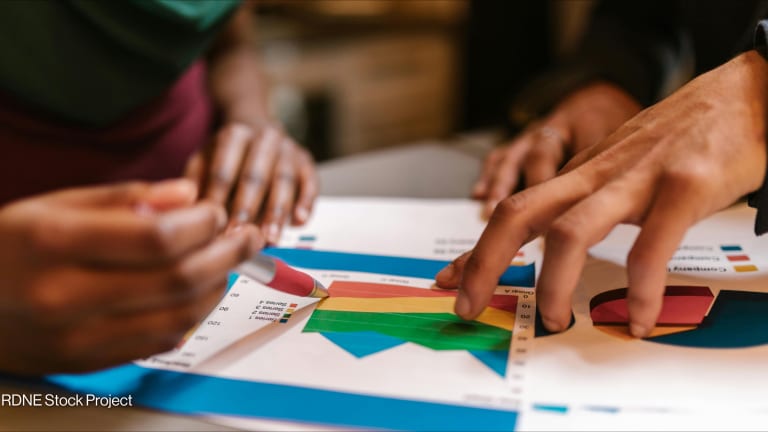Opinion: Women workers challenge gender-based violence and climate risk

For generations, gender-based violence and harassment, or GBVH, in the world of work — including in both paid and unpaid settings — has been a relentless challenge impacting the human rights of countless women and girls around the world. In Bangladesh, 80% of women garment workers reported experiencing or witnessing some form of GBVH at work in 2019. In Nigeria, 57% of women workers in all sectors experienced GBVH at work in 2021, while 55% of flower workers in Ecuador have experienced sexual harassment at some point.
And yet, in the face of this seemingly implacable inequality, a decades-long campaign was waged by the women workers most impacted — primarily from the informal economy in low- and middle-income countries — calling for a binding treaty to prevent GBVH in the world of work. They came from unions, allied worker organizations, and civil society, representing workers across sectors, and including LGBTQ+, migrant and indigenous workers, those with disabilities, and more.
C190’s groundbreaking concepts:
• Recognizes the right to freedom from violence and harassment, including GBVH.
• Defines violence and harassment as a range of unacceptable behaviors or threats that aim to or result in or could result in physical, psychological, sexual, or economic harm, including GBVH.
• Protects all workers and other persons in the world of work, regardless of employment status.
• Covers violence and harassment in the world of work.
• Acknowledges that GBVH disproportionately affects women and girls.
• Stresses the need to tackle the root causes of GBVH, including intersecting forms of discrimination and unequal gender-based power relations in the world of work.
• Notes the impact of domestic violence on the world of work.
This effort, stitched across movements and borders, culminated in June 2019 with the unanimous adoption of the groundbreaking Violence and Harassment Convention, No. 190 by government, employer, and worker delegates at the International Labor Organization. The groundbreaking principles of C190 reflect the lived experience of the women workers in this movement.
Five years on, we have seen significant progress in addressing GBVH in the world of work. However, the pressing global challenges posed by climate change are now jeopardizing progress. From more frequent extreme floods and hurricanes to food and water insecurity, climate disasters have inflamed existing gender inequalities and placed women at higher risk for GBVH concerning work. History has made it clear that women worker leaders are best prepared, equipped, and situated to prevent and address the increased risks of climate change.
How women worker leaders harness C190
Women workers began their campaign when no binding international conventions established norms and standards with respect to GBVH in the world of work existed, and in the face of a notable absence of comprehensive domestic legislation that included workers in the informal economy and migrant workers. With support from key funders, they organized on a national, regional, and international level and joined forces with allied human rights leaders and unions to build momentum for a global labor standard to prevent and address GBVH in the world of work.
Since the adoption of C190, these same women workers, through their global movement rooted in democratic principles, have worked tirelessly to ensure the implementation of the convention. Already, 39 countries have ratified C190, making it the fastest-ratified ILO Convention in history.
C190 in women’s own voices
“The ILO process . . . united us as an entire world; it gave me a sense of belonging to the trade union family. … It has encouraged me and empowered me. Sometimes you think that your problems in your country are the only problems, but then you realize you are not alone and it is important for us to be united and have unity of purpose. Women workers speaking with one voice across the world!” (Fiona Gandiwa Magaya, Zimbabwe Congress of Trade Unions) (Pillinger, Runge, King p. 238).
“I’ve come from far. I’ve come from the industry level; I’ve walked this way for 30 years before I got to this position. …The Convention was very close to my heart, given that I am a women’s leader in my country and in Africa. I see what the women are going through, specifically in the industries where they work, the kinds of violence and harassment they go through at the workplace.” (Rose Omamo, Amalgamated Union of Kenya Metalworkers) (Pillinger, Runge, King at 241-242).
In 2022, a women-led garment workers union in India, outraged by the sexual assault and murder of one of their colleagues by a male supervisor, launched a campaign that culminated in a binding supply chain agreement between the workers, the garment manufacturer, and multinational fashion brands that source from that manufacturer. The agreement created a program incorporating C190’s principles to address GBVH in the factory, and violations of the agreement are met with sanctions.
Leading up to the adoption of C190, women workers in Tunisia, Indonesia, and Cambodia conducted participatory action research to document the scope of GBVH in diverse sectors; now they are using that research to advocate for and design education and awareness campaigns and for language incorporated into collective bargaining agreements. In Honduras, women union workers in the maquila sector have successfully advocated for the inclusion of language in collective bargaining agreements to prevent and address GBVH.
Climate change exacerbates GBVH risk
Women workers in precarious, unpaid, and underpaid jobs — often in the informal economy — experience disproportionate rates of GBVH at work, which is only exacerbated by climate events. Research has already highlighted the link between climate impacts such as heat stress and lower productivity. Women’s socioeconomic realities determine the impact climate change has on their lives, including making them more vulnerable to GBVH in relation to work.
Addressing these impacts cannot be an afterthought when addressing climate change or advancing a just transition, but must be a lens through which we articulate both the problem and solutions. We need interventions for climate change, informed and led by women, that address the structural inequalities that perpetuate the vulnerabilities women workers experience. Only through such efforts will we create enduring solutions that transform women’s lives.
The ILO has found that in the garment sector — a female-dominated industry where rates of GBVH related to pressures to achieve production goals are high — GBVH increases as women struggle to maintain productivity in the face of rising temperature and heat. The Adrienne Arsht-Rockefeller Foundation reports a similar trend in the agriculture and construction sectors.
The United Nations Development Programme has noted that the scarcity of jobs caused by climate events, as well as escalating tensions related to making a living, places women at greater risk of labor exploitation, including GBVH. Evidence has mounted about the link between climate events and GBVH in the world of work, but more research is needed to better understand the extent of the impacts and probe causal connections.
Funders play a critical role in supporting an intersectional approach to solutions
The lived experience of women workers makes a compelling case to support an intersectional approach to climate change — one that centers labor rights and GBVH in the analysis and policy debates and deals with all three issues as a systemic whole. Most importantly, we must ensure that any solutions originate with women workers themselves.
As funders, we have already seen the effectiveness of women worker leaders in identifying interventions and building the power and coalitions needed to implement the kind of change that improves the lives of all workers. We need to support women workers as they identify and respond to the specific ways in which climate change exacerbates gender inequality, marginalization, and discrimination that leads to increased GBVH in the world of work.
Women workers leading to end gender-based violence and harassment at work
Women workers led a global campaign that resulted in a binding international labor treaty — ILO C190 — protecting workers from gender-based violence and harassment in the world of work. Devex spoke with two leaders at the forefront of the movement about what’s needed to implement it.
Together, through Funders Organized Working for Rights in the Global Economy, or FORGE, we support workers’ movements around the globe to strengthen their impact and deepen democratic institutions. FORGE has launched the Democracy at Work Fund with Fundación Avina to support workers’ organizations leading at the intersection of labor rights, democracy, and a just transition. As part of Ford Foundation’s historic social bond allocation, we have provided $25 million over five years to sustain and strengthen women-led global worker networks in the informal economy, including street vendors, home-based workers, and domestic workers as they claim the labor and social protections, as well as the economic stability that all workers deserve.
At Humanity United, we are focused on the rights of migrants in search of work; strategy and grantmaking are now led by a cohort of migrant workers, including domestic workers and those who identify as survivors of trafficking. Our collective support for the transformational organizing efforts of these groups demonstrates our commitment to systemic change for women workers and their families — led by women themselves.
Working together, funders have an opportunity to support an approach that reflects women workers’ reality by focusing on the intersection of climate, labor rights, and GBVH. We need to fund women workers’ organizing, women’s leadership development, and research that reflects women’s lived experience to address the structural barriers to gender equality in the world of work. Only then will we be able to create safe and dignified places of work free from GBVH for everyone, everywhere.
Visit Women Rising — a new narrative series spotlighting the intersection of gender-based violence and harassment and climate change in the world of work.
This content is sponsored by FORGE. To learn more, visit the series website.

Search for articles
Most Read
- 1
- 2
- 3
- 4
- 5










